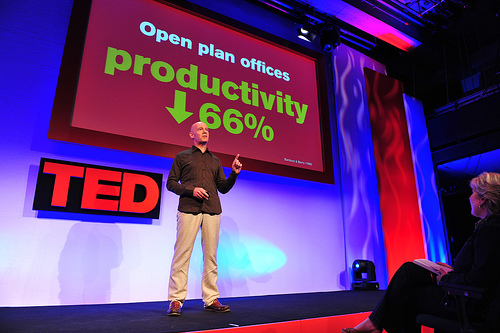
TED U celebrates the fact that the people who attend TED are just as interesting as the speakers and performers onstage. Here are selected running notes from Tuesday morning’s two sessions:
Ian Goldin, from the James Martin 21st-Century School in Oxford, shared six things we will need to know about the year 2030. Among his points: We’ll see more globalization — and Goldin sees two Achilles’ heels of globalization: inequality (and the growing rift between the “haves” and those who are left out, those who are angry) and complexity, the growing brittleness of our interconnected world, the possibility of systemic shock from one incident rippling around the globe. In 2030, population pressures will change — in developed countries, people will get older on average. Which will affect current systems of taking care of older people, he says: Developed countries will need to attract younger immigrants “to drive our economies and push us around in our wheelchairs. Xenophobic concerns will be turned on their heads.” As he says, “The rest of our lives will be in the future. We have to plan for it now.”
Cynthia Schneider of the Brookings Institution, gave an eye-opening talk called “How American Idol Changes the World.” With footage from competitions in Pakistan and Afghanistan, she shows how these merit-based competitions, open to anyone, are giving new vitality to tribal values: “Does it introduce Americanization? No, just the opposite is happening.” She tells the story of Aydah Al-Jahani, a Saudi woman who entered an American Idol-style poetry competition called Millions’ Poet that airs in Arabic-speaking countries. Wearing a full niqab, she made it to the final rounds. A key value of these shows in tribal cultures: “Contestants learn how to lose gracefully without avenging the winner.” She closes with news of a new show, “The Candidate,” in Afghanistan, where young people present competing policy platforms in a reality show environment.
Barbara Aronson is the founder of Research4Life.org. Her talk, “How to ‘Give Away’ Scientific Research — And Make a Difference,” detailed her work in bringing cutting-edge scientific research to doctors and researchers in poor countries who can’t afford expensive medical journal subscriptions. By giving this these studies and data free to doctors in Africa, not only does this project help them provide better care, but it encourages more doctors around the world to do their own research and contribute to the body of medical knowledge.
Julian Treasure, from the Sound Agency, gave a charming talk called “Sound Affects!” which demonstrated — pleasantly and unpleasantly — how sound influences our happiness and our ability to work, shop and navigate life. Working in a noisy open-plan office, his stats show, reduces productivity a shocking 66 percent; shops that play unpleasant music can lose 20 percent of potential business. Among the many takeaways: “I recommend everyone listen to 5 minutes of birdsong a day.”
Sam Martin, the writer for frogdesign US, showed a groovy slideshow of “Manspace: The Spaces That Men Carve Out for Themselves.” Inspired by a few manly garages and basements in his hometown of Austin, Texas, he said, “I wanted to go out on a journey and see what spaces men create. I didn’t find what I expected to find: pyramids of beer cans. What I found: men who make spaces for their passions — spaces that reflect who they were and what they loved to do.” Some very appreciative and jealous low-pitched ooooohs when he shows slides of these special, customized, personal spaces.
Above: Julian Treasure. Photo: Duncan Davidson / TED.com
Comments (4)
Pingback: No, idiot. Discomfort Is Bad. « Michael O.Church